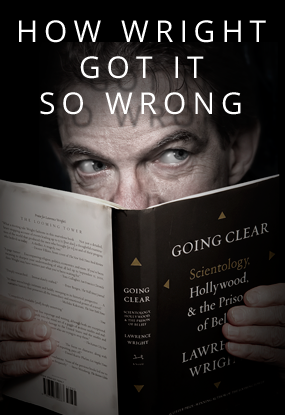A Correction of the Falsehoods in Lawrence Wright's Book on Scientology
Wright states, “The extent to which Scientology was influenced by Hubbard’s involvement with the OTO has long been a matter of angry debate… Nibs—Hubbard’s estranged eldest son and namesake, L.
Ron Hubbard, Jr. (he later changed his name to Ronald DeWolf)—claimed that his father had read the book [Aleister Crowley’s The Book of the Law] when he was sixteen years old and developed a lifelong allegiance to black magic.” Wright further quotes DeWolf saying that “Black magic is the inner core of Scientology—and it is probably the only part of Scientology that really works.”>> True Information: What Wright alleges is patently false.
The London Sunday Times published a similar lie in October 1969, drawn from Jack Parsons’ correspondence with Aleister Crowley, yet when presented with the truth, the Times retracted its story in a published correction in December 1969.
A 1971 High Court of Justice decision in England supported the Church’s demand that the authors of the 1952 Crowley biography remove the libelous insinuation that there was a connection between Scientology and Aleister Crowley’s OTO.
One of Wright’s sources is a 1983 interview of Ronald DeWolf in Penthouse magazine. DeWolf later recanted his statements against his father in sworn affidavits of May 20, 1987 and July 1, 1987.
In his May 20, 1987 statement, DeWolf admitted that his allegations against his father were:
“no more than wild flights of fantasy based on my own unlimited imagination.”
De Wolf also admits that that because of his father’s extensive travels, he had limited first-hand knowledge of his activities:
“Because L. Ron Hubbard’s lifestyle, first as a writer and then later as a Naval officer during World War II, was such that he traveled a great deal, my personal knowledge of Mr. Hubbard prior to the end of World War II was greatly limited. In fact the only period in which I spent an appreciable amount of time at all with Mr. Hubbard was between 1951 and 1959, when I was a member of the church of Scientology. Even then, however, he continued to travel and we were often separated. What personal knowledge I do have concerning L. Ron Hubbard and the church of Scientology ended in late 1959.”
In the book’s endnotes Wright attempts to debunk DeWolf’s 1987 recantation by alleging that DeWolf subsequently, five years later, testified in Clearwater Commission Hearings against the Church and said he signed the recantation “in order to protect my wife and children” from the Church. The only problem is, those Clearwater Commission Hearings were not five years later—they were five years earlier, on May 6, 1982 and concerned events that had happened in the 1970s. In other words, while Ron DeWolf did switch allegiances more than once between leaving Scientology in 1959 and his death in 1990, his 1987 recantation was his last official word on the matter—he clearly admitted he had falsely maligned his father.
